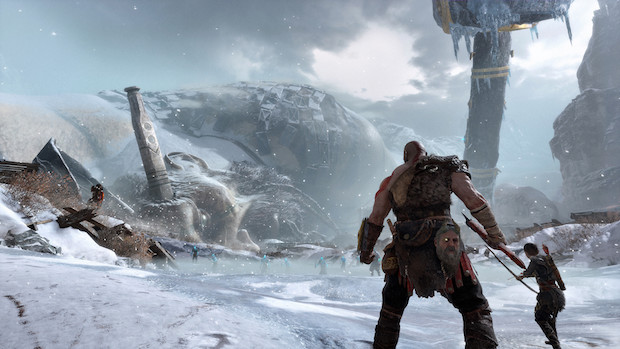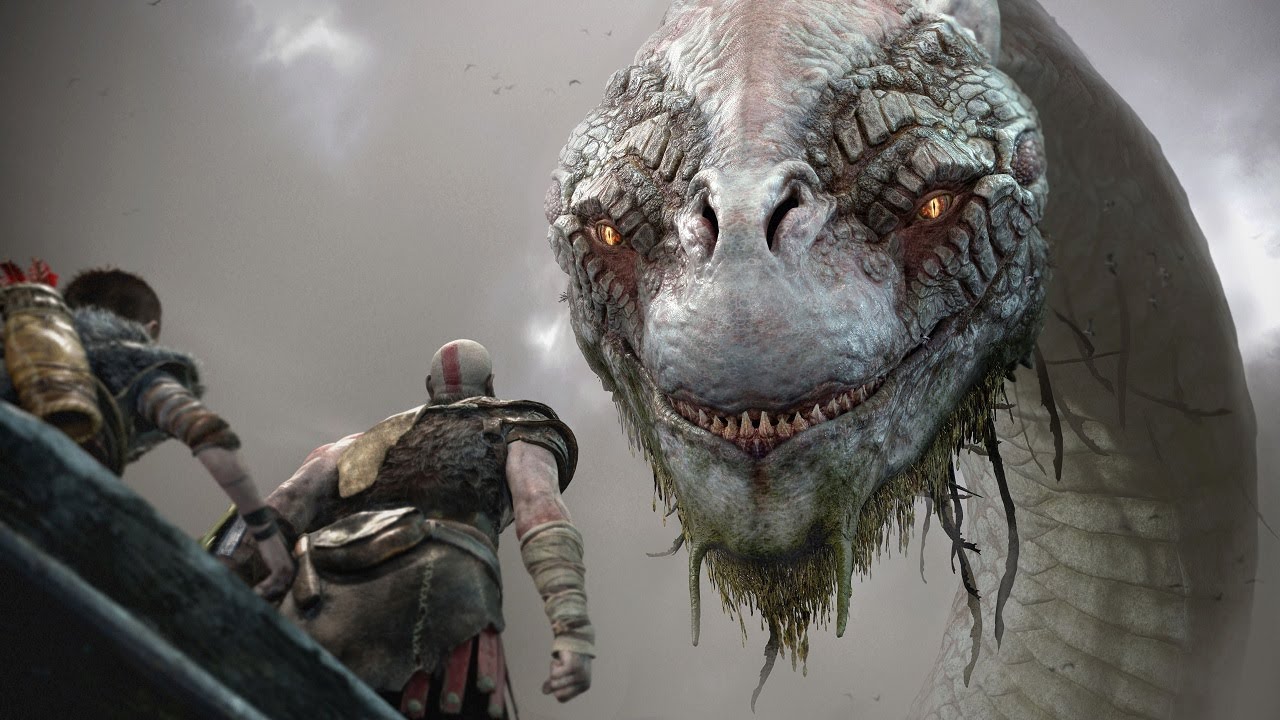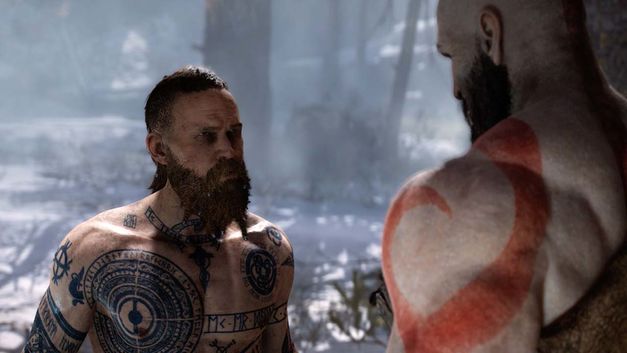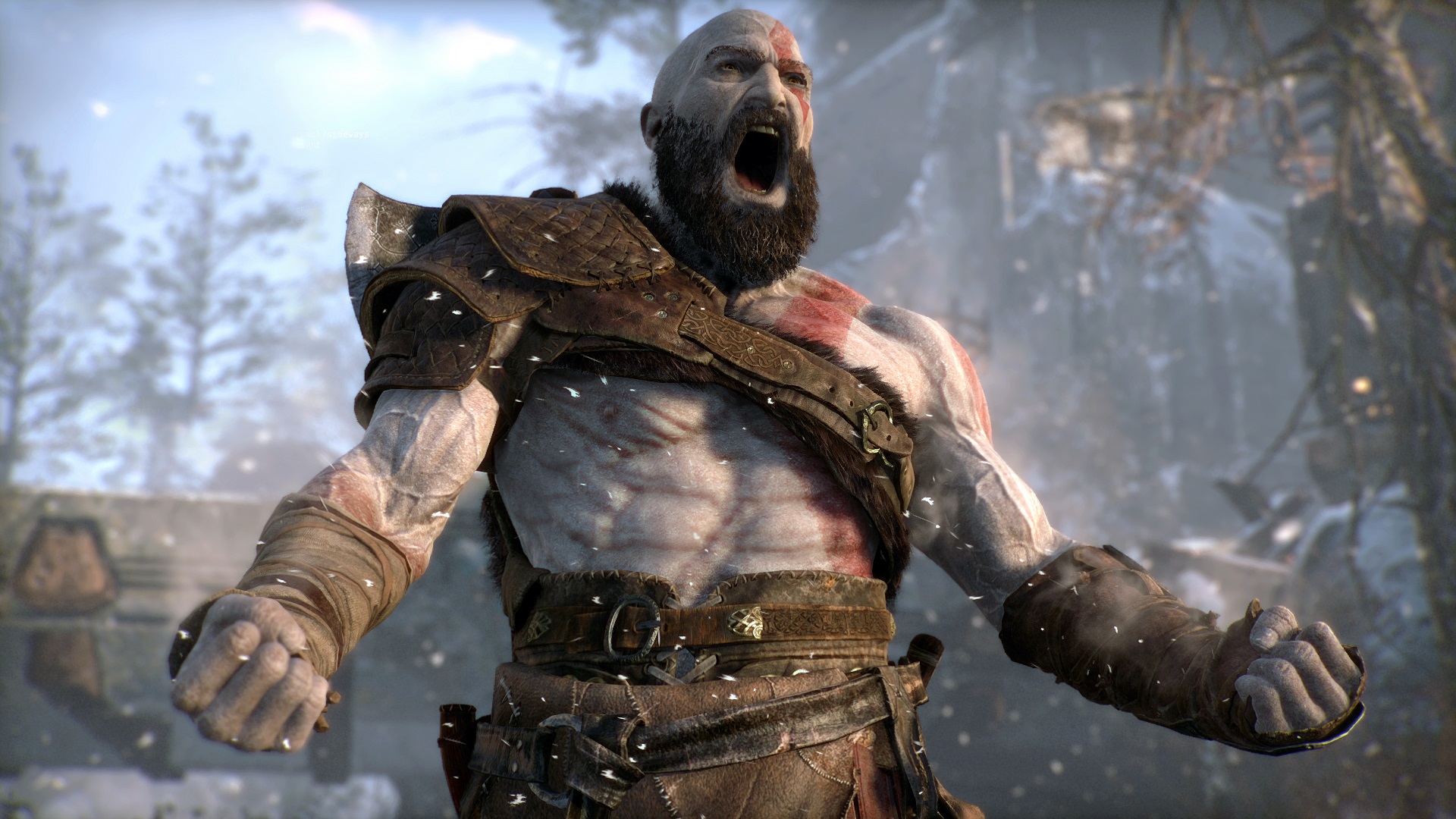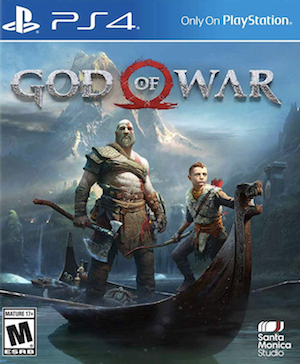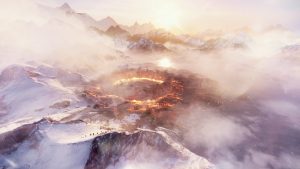
God of War is, above all else, a story about a father and his son, and how the two of them slowly come to know and understand one another, and how they help each other grow as people. But while that is indeed the heart of the entire game’s story, there is just so much more that’s going on. Like all great stories, this game’s strengths lie in its strong writing and character development, but also like all great stories, those are far from being it’s only strengths. Because while this is a a very personal story about a father-son relationship, it’s also a story about the ever-present looming threat of the end of the world and everything in it.
WARNING: There are major spoilers ahead. Turn back now if you haven’t finished the game.
Much like its precursors were steeped in the events of Greek mythology, so too is the new game set in the backdrop of Scandinavian mythology, in a time before the Vikings ruled the land. And this backdrop is so much more than just stage dressing. It’s there not because it would be a “cool” location to set a game in, but because it’s fundamental to so much that happens in the story. And while Norse mythology is inherently truly fascinating, this game’s particular take on Norse mythology is a very interesting one.
Why? Because it treats it with the appropriate gravity and respect, and it is so faithful to it that understanding Norse mythology could also clue you in to where the sequels will end up heading. And yet, at the same time, it isn’t too faithful to it either. It doesn’t follow everything to the letter, and it puts its own unique spins on things every now and then, making it all fit within the context of the series, rather than it being the other way around. And so, while a person with great knowledge of the mythology could possibly have an idea about what’s going to happen next, this game also makes sure to do things its own way, so that you can never be too sure about whether or not the stuff you think is going to happen will actually end up happening.
Nothing feels like it doesn’t make sense- of course, it doesn’t have to. As is evidenced by Marvel’s adaptation of Norse mythology, a story can be full of inaccuracies and still be really, really good. These are, after all, fiction, not accurate accounts and retellings of their source material. But the game’s genius is that it tells the story it wants to tell, but does while being surprisingly accurate to the mythology it is based off of.
The example most emblematic of that is, of course, the game’s big final revelation- the fact that Atreus is Loki. Yes, the Loki. For anyone who doesn’t know much about Norse mythology and plays this game, the very last minutes of the game would be, at most, a cool twist. But if you have some knowledge of the source material, you begin to realize just how well it fits. As per Norse mythology itself, Loki is considered an honorary Vanir, so to speak, but he isn’t actually Asgardian. He is a giant, the son of Laufey and Farbauti. He is also a shapeshifter, who can transform into any animal, and is most often associated with wolves. He is, in fact, also the father of Jormungandr, the World Serpent, and Fenrir, the wolf (among others).
In the game, of course, Loki’s mother is also revealed to be a giant named Faye (short for Laufey), while in the murals in Jotunheim right at the end, Kratos is also referred to as Farbauti. In fact, Kratos is, as you might remember, the grandson of Cronos, the king of Titans, and though Titans and giants aren’t necessarily the same thing, it still works surprisingly well. As Kratos reveals to his son at the end, Atreus is the name he was given at birth, but Faye initially wanted to name him Loki, which is the name the giants use while referring to him. Atreus’ runic summons in the game are also in keeping with the fact that he is, in fact, Loki- all of them involve him summoning animals, with the very first summon you unlock for him being one that summons – you guessed it – a wolf.
So Loki’s heritage and characteristics as per the mythology itself remain intact, while also letting him be the son of Kratos make perfect sense. It also makes sense that Loki – or Atreus – is able to interact with the World Serpent in the game, because even though he is his father, the Serpent is actually from the future, knocked back in time by the force of a deadly blow from Thor during Ragnarok, as Mimir explains near the end of the game. So Loki is, admittedly, yet to father Jormungandr, but since the Jormungandr he interacts with is from the future, it all still makes sense.
Speaking of Ragnarok, the game’s take on the world-ending event of Scandinavian mythology and everything it entails is also a fascinating one. It remains true to the source material, for the most part, but it does so while making it all fit within the context of the narrative of both, itself, and the games that preceded it. As per Norse mythology, Ragnarok is supposed to be a cataclysmic event centred around the war between the Vanir and the Jotun, an event that will bring about the apocalypse itself. As per the myth, when Loki causes the death of Baldur through the use of mistletoe, the one thing in all of the cosmos that can physically harm him, it triggers the events of Fimbulwinter, a winter that lasts for three years and leads directly into Ragnarok itself.
And this, too, fits perfectly with the events portrayed in the game. Early on in the game, Atreus is gifted a bunch of mistletoe arrows by Sindri, as a token of gratitude after Kratos and Atreus kill a dragon and save his life. In a seemingly innocuous and insignificant moment a while later, Kratos sees that one of the straps of Atreus’ quiver is broken, and uses one of the arrowheads to fix it. Later on, when Kratos and Atreus meet Freya, who is, of course, the mother of Baldur, Freya sees the mistletoe arrows, and she panics, fearful of the possibility of them harming and possibly killing her son, and she burns them- all except the one tiny piece that is fastened to Atreus’ quiver.
Ultimately, later on in the game’s climax, Baldur punches Atreus in the chest in what is an absolutely genius scene, and the arrowhead fastened to Atreus’ quiver’s strap pierces Baldur’s hand. This breaks the spell that makes him immune to all physical pain, giving Kratos the opportunity to ultimately kill him. Doing so, of course, kicks off Fimbulwinter, as Mimir tells the father and son that they’ve done something that has blown the events of Ragnarok out of schedule and brought them forward. The game runs with the idea of Kratos’ son being Loki, and makes it all work perfectly.
It does it so well, in fact, that looking at the source material can give us some pretty good clues about what might happen next in the series. Loki is said to have an uncomfortable relationship with the Asgardians, often aiding and counselling them in several matters, but eventually going on to be the one that causes their ultimate downfall. Which is what leads us to believe that Atreus might possibly be switching sides – at least temporarily – in future games. Remember, he still doesn’t know a lot about Kratos’ past, except that he killed his own father. He doesn’t know that Kratos basically caused the destruction of all of Greece, or that he killed his own wife and daughter.
Is it not possible that Odin, being the master manipulator that he is, might try to use this information to sow discord between Kratos and Atreus, to try and get the latter on his side? The effects may be temporary – by the time this particular story comes to an end, Loki and his children will obviously not be on the side of the Vanir– but it’s entirely conceivable that that does, in fact, end up happening. Since the launch of the game, creative director Cory Barlog has mentioned on several occasions that that with Atreus, the new games are going to tell the origin story, so to speak, of Loki. And while it’s true that Atreus is very much his own character, rather than being a 1:1 adaptation of the one portrayed in the mythologies, it’s still very exciting to think of the possibilities of just how this kid will transform into the shape-shifting trickster that the world knows Loki as.
It’s also entirely possible that time travel will be a huge plot point in the game’s sequels. Hell, given this series’ propensity to meddle with time and causality, it’s almost a certainty. Jormungandr’s presence before Kratos and Atreus has already established that time in this particular chapter of the series’ story isn’t going to be any more linear than it has been in the past, while there have also been several other hints throughout the game that suggest that the movement of time across different realms is quite different. This, of course, leads us to our next theory- could Kratos, at some point in the story, travel back in time to bring the giants of Jotunheim to the present to fight in Ragnarok?
The game’s very last scenes show that all the giants, even the ones in Jotunheim, are dead. Ragnarok, though, is supposed to be a war on a massive scale between the Jotun and the Vanir. However, how exactly is that supposed to happen if there are no jotun left in all the nine realms? Perhaps, in an echo of what happened in the second game, Kratos might bring back an army of giants with him from the past to fight against the enemies in Ragnarok. Unlike the second game, however, this wouldn’t be in as much danger of creating a time paradox in the story, because here, even as per Norse mythology itself, the giants were very much still a factor during Ragnarok.
Recently, we interviewed Cory Barlog, and among the many, many things we spoke of was the use of Norse mythology, and how while making use of it, it tries to strike a balance between being accurate, and telling the story it wishes to tell (you can listen to the one hour-long spoilercast here). And Norse mythology, Barlog mentioned, is perfect for that kind of thing. Because not only are there multiple sources and multiple accounts of the mythologies, leading to several different interpretations, the current series itself is also set during the time when accounts for all these events were a long, long way away from being written.
That is a decision Barlog and the writers consciously made, a decision that led them to take the kind of liberties that may be at odds with some accounts of Norse myths, but also not completely implausible. For instance, in the game, Freya takes on a role that many might associate with the mythological figure known as Frigg. According to several sources of Norse mythology, it was Frigg who married Odin and gave birth to Baldur, and it was Frigg who put a spell on her son that would prevent him from any and all physical and mental pain. As per these accounts, Freya was Frigg’s sister. But then again, there are also several sources that claim that Freya and Frigg are actually the same person, who were bifurcated into different people by subsequent accounts and retellings as time went on.
This is just another example that shows us that even in taking liberties and diverting away from what might be considered accurate, the game does so in a way that is authentic to the source material itself. Most impressive, however, is the fact that in doing all this, it remains true not only to the mythologies themselves, but also the history of the series as well. This still very much feels like a God of War story, and Kratos, his past, and all the baggage he carries feel like a crucial part of the narrative. Rather than reshaping the franchise to make it fit within the context of Norse mythology, the game does the opposite, and it does so very smartly. Among several other achievements, Sony Santa Monica deserves to be lauded for that.








